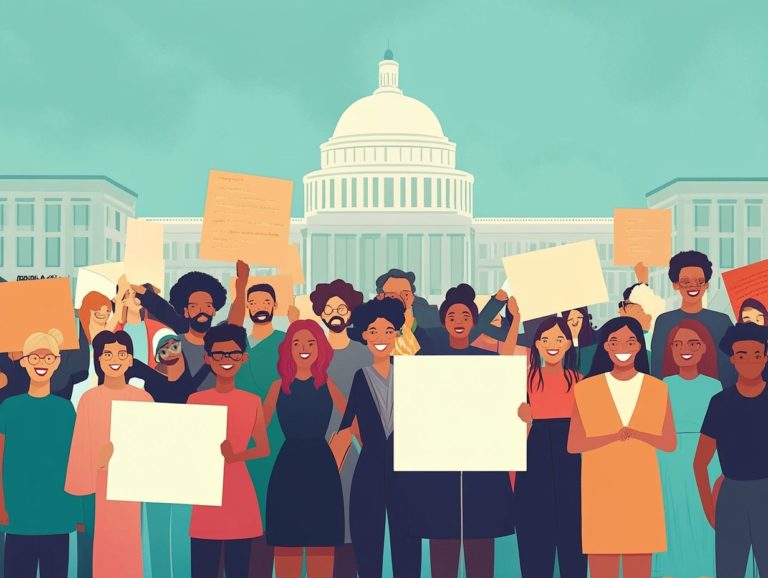How to Communicate Your Rights to Authorities
Know your rights! They are your best defense in tough situations. Understanding your rights is crucial as you navigate various aspects of your life whether at work, in public spaces, or during legal encounters.
This article explores your fundamental rights, outlining the specific entitlements you possess in different scenarios and offering practical strategies for standing up for your rights. You will discover how to communicate your rights effectively, identify the right moments to voice your concerns, and handle any resistance that may arise.
You will learn when and how to seek legal help, ensuring that you are fully supported in every situation you encounter.
Contents
- Key Takeaways:
- Understanding Your Rights
- How to Communicate Your Rights Effectively
- When to Communicate Your Rights
- Handling Resistance and Consequences
- Seeking Legal Assistance
- Frequently Asked Questions
- What are my rights when communicating with authorities?
- How can I effectively communicate my rights to authorities?
- Do my rights change depending on the type of authority?
- What should I do if I feel my rights are being violated by authorities?
- Are there consequences for not communicating my rights to authorities?
- Can I still assert my rights if I am not a native speaker?
Key Takeaways:

1. Know your basic rights and understand them thoroughly to communicate them to authorities.
2. Assertiveness and confidence are key in communicating your rights. To enhance your knowledge, consider learning how to stay informed about your rights and use effective communication strategies to get your message across.
3. Identify appropriate situations to communicate your rights and stand up for yourself.
4. Be prepared to face resistance and potential negative outcomes when communicating your rights, but stay firm in your beliefs.
5. Knowing when to seek legal assistance and how to find it can be crucial in protecting your rights.
Understanding Your Rights
Understanding your rights is essential when navigating housing issues, especially in affordable housing advocacy.
With valuable resources like the National Low Income Housing Coalition (NLIHC) at your fingertips, along with insights from seasoned advocacy organizers, you can assert your rights and seek legal assistance when facing law enforcement encounters.
Engaging with public officials and articulating these rights effectively can spark significant changes in housing policy that truly matter.
Know Your Basic Rights
Understanding your basic rights is crucial in pursuing affordable housing and advocating effectively.
By familiarizing yourself with protections under federal and state laws, you can navigate your legal rights and access essential advocacy resources, including those offered by the NLIHC.
These protections cover critical areas, such as tenant rights against unjust eviction and discrimination in rental practices based on race, gender, or disability. Grasping these fundamental rights enables you to champion justice within your community.
Numerous resources, such as legal aid organizations and local housing authorities, can help you understand your entitlements and the processes for reporting violations.
Educational seminars and online courses can provide deeper insights into housing law, ensuring you have a fair opportunity to secure stable and affordable living conditions.
Know Your Rights in Specific Situations
Understanding your rights in specific situations whether during police encounters or when dealing with housing authorities is essential for effective self-advocacy.
Being aware of your legal options and protections, such as those under the Americans with Disabilities Act, gives you the confidence to assert your rights. For instance, if you encounter discrimination in housing due to a disability, knowing that the Fair Housing Act (a law that protects against housing discrimination) prohibits such practices can be transformative.
Similarly, during an interaction with law enforcement, understanding the protections offered by the Fourth Amendment against unreasonable searches and seizures can lead to a fairer experience.
To navigate these intricate matters, many individuals seek advocacy organizations that provide valuable resources, legal advice, and emotional support.
For example, a tenant facing eviction without just cause reached out to a local housing advocacy group for assistance. They secured legal representation and successfully contested the eviction, demonstrating the power of informed advocacy.
How to Communicate Your Rights Effectively
Effectively communicating your rights is essential in advocating for affordable housing and driving meaningful policy changes.
Utilizing diverse communication methods, such as storytelling, allows you to personalize your message, making it resonate with members of Congress and public officials.
Employing advocacy tips can significantly amplify the impact of your outreach efforts, ensuring your voice is heard and valued in the conversation.
Empower yourself! Learn about your rights today and take the first step toward advocacy.
Assertiveness and Confidence

Being assertive and confident in advocating for your rights is crucial for effective communication. This approach helps you achieve the outcomes you desire.
By using advocacy tips that emphasize assertiveness, you can present your case compellingly. You’ll engage more effectively with public officials.
This skill not only empowers you as an advocate but also sets the stage for meaningful conversations with decision-makers. Start by recognizing your worth and preparing thoroughly for discussions.
Practice active listening to show respect for others involved. It fosters mutual understanding and strengthens your message.
Building relationships with representatives through consistent outreach is invaluable. A strong rapport encourages open communication and makes them more receptive to your concerns.
Embrace these strategies to boost your confidence and clarity in advocacy!
Effective Communication Strategies
Using effective communication strategies is vital in advocating for your rights. Emails, letters, phone calls, and face-to-face meetings each have unique benefits.
Emails allow for quick and concise messages to a broad audience. Letters add a personal touch, conveying passion and commitment.
Phone calls enable real-time dialogue to address questions and clarify your points. Face-to-face meetings foster deeper connections and nuanced discussions.
Tailor your communication style to your audience for better understanding. Whether it’s a formal presentation or a casual chat, adapt your approach accordingly.
Successful outreach often combines these methods. For instance, following a meeting with a thoughtful thank-you email can solidify relationships and reinforce your key messages.
When to Communicate Your Rights
Knowing when to assert your rights can greatly affect your advocacy’s effectiveness, especially regarding affordable housing. Timing your outreach strategically ensures your message aligns with current legislative discussions.
By engaging with members of Congress at the right moments, you maximize your advocacy resources.
Identifying Appropriate Situations
Recognizing the right moments to assert your rights is crucial. This is particularly true in housing advocacy.
Understanding when and how to engage with law enforcement can enhance your outcomes and drive meaningful change. This is especially critical in vulnerable situations, like facing eviction.
As an advocate, equip yourself with knowledge and resources to articulate your clients’ rights clearly. Understanding the broader context allows you to navigate complex dynamics with sensitivity.
Prepare for potential confrontations and grasp the nuances of each case to promote constructive dialogues and systemic improvements.
Handling Resistance and Consequences
Dealing with resistance is part of advocating for your rights, especially in affordable housing. By using effective communication techniques, you can manage pushback from law enforcement or housing officials.
Transform challenges into opportunities for meaningful dialogue and positive change.
Dealing with Pushback and Negative Outcomes

Navigating pushback and negative outcomes can be challenging but rewarding! It s an essential aspect of standing up for your rights in housing advocacy. By using effective communication techniques and strategic advocacy tips, you can respond constructively and focus on achieving positive results.
One powerful strategy is to remain calm and composed, even in the face of hostility or resistance. For example, picture yourself encountering a law enforcement officer while discussing a landlord’s eviction notice. Instead of reacting defensively, choose to articulate your understanding of tenant rights clearly. This approach helps de-escalate the situation and ensures that your perspective is communicated effectively.
Keep important legal documents on hand. This shows you are serious about finding a solution. Being well-informed enables you to navigate interactions with officials confidently while safeguarding your rights.
Seeking Legal Assistance
Seeking legal assistance is an essential step in addressing housing issues and advocating for your rights, especially when navigating complex legal landscapes.
Organizations like the NLIHC and reputable legal firms offer invaluable advocacy resources and expertise to support you in confronting housing challenges.
When to Seek Legal Help
Act quickly to seek legal help when necessary. Knowing when to seek legal help is crucial for effectively asserting your rights in various housing matters, especially during police encounters or disputes with landlords. Understanding the situations that call for legal intervention enables you to take timely action.
Recognize key moments like receiving an eviction notice or experiencing harassment from a landlord that signal the urgent need for professional legal support. Encounters with law enforcement can escalate quickly, making it critical for you to be aware of your rights during those moments.
Acting swiftly boosts your chances of a favorable outcome and helps prevent complications that could lead to serious consequences. Therefore, remaining vigilant and prepared to seek guidance is vital in safeguarding your legal standing.
How to Find Legal Assistance
Finding legal assistance is essential when facing housing issues, and various advocacy resources can help you through the process.
Start by assessing your unique housing situation and determining the type of legal support you require, whether it s eviction defense, lease negotiations, or housing discrimination assistance.
Reaching out to local housing advocacy groups can provide valuable insights and resources specific to your area. Exploring online platforms dedicated to legal aid can also connect you with experienced attorneys who specialize in housing laws.
Utilizing these advocacy resources allows you to find the appropriate legal representation and support to protect your housing rights.
Frequently Asked Questions

When communicating with authorities, you have the right to remain silent, the right to an attorney, the right to a fair trial, and the right to be treated with respect and dignity.
Stay calm and assertive when you talk to authorities. Clearly state your rights and refer to resources on how to effectively assert your rights, while providing any relevant documentation or evidence to support your claims.
Take charge of your rights today knowledge is power!
Your rights can change based on who you are talking to. For example, if you speak with law enforcement, you can remain silent and request a lawyer. These rights might not apply when dealing with a government agency.
If you think your rights are being violated, calmly inform them. If things get heated, seek legal advice and representation immediately.
Yes, if you don t assert your rights, authorities might unknowingly overstep their boundaries. Knowing your rights helps protect you.
Can I still assert my rights if I am not a native speaker?
Absolutely! You have the right to request an interpreter. This ensures you understand your rights clearly and can communicate them effectively.






